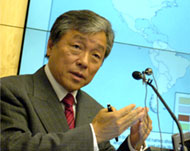World Bank warns of pandemic cost
A human influenza pandemic could cost the world’s richest nations $550 billion, the World Bank has said as health experts from around the world drew up a battle plan to combat the deadly bird flu virus.

The Director-General of the World Health Organisation (WHO) Lee Jong-Wook said the H5N1 avian influenza virus, known to have killed 63 people in four Asian countries and led to the culling of 150 million birds worldwide, was spreading fast.
“We have been experiencing the relentless spread of avian flu. Migratory birds, as they move around the world to seasonal breeding and feeding grounds, are infecting domestic poultry flocks around the world,” he told the conference in Geneva on Monday.
He said it was a matter of time before an avian flu virus, most likely H5N1, acquired the ability to be transmitted from human to human.
“We don’t know when this will happen, but we know it will happen,” Lee said. “No society will be exempt.”
The virus is hard for people to catch and is passed on almost exclusively through human contact with birds.
But should it spark a human pandemic, the cost to industrialised countries could be huge, the World Bank said.
Report warns
In a report on bird flu, it said previous studies on flu pandemics had suggested any new outbreak could kill 100,000 to 200,000 people in the United States, which it said translated into economic losses for the country of between $100 billion and $200 billion.
 |
|
WHO’s Lee Jong-Wook warns the |
This included 700,000 or more hospital admissions, up to 40 million outpatient visits and 50 million additional illnesses.
“If we extrapolate from the US to all high-income countries, there could be a present-value loss of $550 billion. The loss for the world would of course be significantly larger, because of the impact in the developing world,” the World Bank said in a report obtained by Reuters.
It noted a 2% loss of global gross domestic product during a pandemic – like that caused by Sars in East Asia during the second quarter of 2003 – would represent about $200 billion in losses in one quarter or $800 billion in a year.
Experts are racing against time to prevent the spread of a virus which has recently moved from Asia to eastern Europe and is expected to move into the Middle East and Africa.
China has asked the WHO to help probe a possible human case of bird flu after the death of 12-year-old girl who was suffering from pneumonia.
China outbreaks
China has reported four outbreaks of the virus among birds in a month but the world’s most populous country has seen no confirmed cases among humans.
|
“The core of the problem is the circulation of H5N1 virus is domestic poultry; priority action for solving the problem is therefore at the level of the animal” Samuel Jutzi,FAO animal production and health division director |
Experts told the conference the focus should be on containing the spread of the virus among poultry and limiting contact between sick birds and humans.
“The core of the problem is the circulation of H5N1 virus is domestic poultry; priority action for solving the problem is therefore at the level of the animal,” said Samuel Jutzi, director of the animal production and health division of the UN’s Food and Agriculture Organisation.
“This is the only way by which the likelihood of the H5N1 virus acquiring human-to-human transmissibility can be influenced,” he added.
Time to act
Experts said that while the world had a window of opportunity to act, time was tight.
“Normally it takes six months to design a programme of this kind. We have three days,” the senior UN coordinator for avian and human influenza, David Nabarro, said, stressing the need to boost surveillance and reporting.
He also said policies needed to be developed for more research into drugs and vaccines.
As part of the global strategy, the World Bank will launch an appeal for a $1 billion fund at the conference, half of it to be provided through its grants or interest-free loans and half by donors, according to Jim Adams, a senior World Bank official.